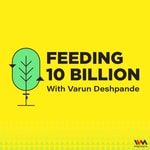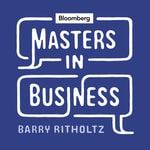Feeding 10 Billion – Details, episodes & analysis
Podcast details
Technical and general information from the podcast's RSS feed.

Feeding 10 Billion
IVM Podcasts
Frequency: 1 episode/31d. Total Eps: 28

By the year 2050 we will have 10 billion people on our planet - a sixth of whom will be in India. If we want to feed all 10 billion of us in a sustainable, healthy and just way, we need to reimagine how we source our food. Feeding ourselves cannot come at the cost of global health, worsening greenhouse gas emissions, excessive land, water and resource use, zoonotic diseases, antibiotic resistance, and needless suffering. Last season, we brought you a ringside view of the next food revolution that is rethinking the future of protein. Companies like Memphis Meats, Impossible Foods, Beyond Meat and JUST Egg had a blockbuster year making meat, eggs, and other animal-sourced foods from plants, or cells, or other ingredients that are delicious and nutritious for us, and vastly better for the planet. The Covid-19 pandemic has only made the importance of protein diversification evident. If you want to be part of the future of food and work on solutions to some of the biggest problems of our time, join the Good Food Institute’s Varun Deshpande and Ramya Ramamurthy on Season 2 of Feeding 10 Billion
Recent rankings
Latest chart positions across Apple Podcasts and Spotify rankings.
Apple Podcasts
🇬🇧 Great Britain - food
18/06/2025#96🇬🇧 Great Britain - food
17/06/2025#64🇬🇧 Great Britain - food
08/06/2025#63🇨🇦 Canada - food
26/11/2024#87🇨🇦 Canada - food
25/11/2024#56🇨🇦 Canada - food
24/11/2024#34🇨🇦 Canada - food
22/11/2024#94🇨🇦 Canada - food
21/11/2024#65🇨🇦 Canada - food
11/09/2024#82
Spotify
No recent rankings available
Shared links between episodes and podcasts
Links found in episode descriptions and other podcasts that share them.
See all- https://omnystudio.com/listener
840694 shares
- https://ivm.today/android
4087 shares
- https://ivm.today/ios
3005 shares
RSS feed quality and score
Technical evaluation of the podcast's RSS feed quality and structure.
See allScore global : 84%
Publication history
Monthly episode publishing history over the past years.
Kate Krueger on Cultivating a Better Protein Supply
Episode 5
mardi 14 décembre 2021 • Duration 41:28
Luckily, competitions like the XPRIZE Feed the Next Billion are designed to do exactly that. If you’ve been listening to previous episodes, you will recall that the prize offers $15 million to finalists who come up with innovative solutions to combat challenges within the smart protein ecosystem..
To go a step beyond and understand what exactly we need from a technological standpoint when it comes to building a viable future for cultivated meat, our host, Varun Deshpande, sits down with Dr. Kate Krueger. The founder of Helikon Consulting and a technical expert for XPRIZE, Kate tells us about her pioneering work around advancing cellular agriculture, making smart protein accessible — particularly in the developing world — and her hopes for the impact that the XPRIZE’s diverse participants can have on our food systems.
Resources for further reading:XPRIZE Feed the Next Billion and the competition’s semifinalists(https://www.xprize.org/prizes/feedthenextbillion)
(https://www.foodnavigator-usa.com/Article/2021/07/14/XPRIZE-unveils-semi-finalists-in-15m-global-Feed-the-Next-Billion-competition)
Eat Just’s mission to serve up cultivated chicken in Singapore (https://thespoon.tech/eat-just-makes-the-worlds-first-sale-of-cultured-meat/)
The science behind cultivated meat and the impact it has on the environment(https://gfi.org/science/the-science-of-cultivated-meat/#:~:text=Cultivated%20meat%2C%20also%20known%20as,and%20farm%20animals%20for%20food.)
(https://www.greenqueen.com.hk/cultivated-meat-has-92-lower-climate-impact-will-reach-price-parity-by-2030-says-new-research/)
McKinsey’s report on cultivated meat, highlighting consumer insights and industry concerns(https://www.mckinsey.com/industries/agriculture/our-insights/cultivated-meat-out-of-the-lab-into-the-frying-pan)
Follow Kate:Twitter: twitter.com/KateKruegerPhDLinkedIn: http://linkedin.com/in/ktkruegerlinkedin.com/in/ktkrueger
You can connect with Varun Deshpande:
Find GFI on Social Media:
Website | Twitter | Instagram | Facebook | LinkedIn | YouTube
You can listen to this show and other awesome shows on the IVM Podcasts app on Android: IVM Podcasts - Apps on Google Play or iOS: IVM Podcasts, or any other podcast app.
You can check out our website at https://shows.ivmpodcasts.com/featured
See omnystudio.com/listener for privacy information.
Bernhard Kowatsch on Transformative Food Innovation
Episode 4
mardi 14 décembre 2021 • Duration 40:08
In this episode of Feeding 10 Billion, we’re joined by Bernhard Kowatsch, who champions this notion through his work at the Innovation Accelerator at the United Nations World Food Programme (WFP). As head of the accelerator, Bernhard is on a mission to identify, support, and scale startups working towards eradicating hunger and his work is closely aligned with our Mission for Smart Protein. Join our host, Varun Deshpande, and listen to Bernhard deftly join the dots between climate change, poverty, hunger, and nutrition.
Resources for further reading:The World Food Programme’s Nobel Peace Prize: What does hunger have to do with peace?(https://www.wfp.org/nobel-laureate#:~:text=This%20year%2C%20WFP%20was%20awarded,as%20a%20weapon%20of%20war%22.)
XPRIZE Feed the Next Billion and the competition’s semifinalists(https://www.xprize.org/prizes/feedthenextbillion)
(https://www.foodnavigator-usa.com/Article/2021/07/14/XPRIZE-unveils-semi-finalists-in-15m-global-Feed-the-Next-Billion-competition)
The importance of innovation in fighting world hunger (https://innovation.wfp.org/blog/forbes-how-innovation-helping-fight-global-hunger)
How innovation can emerge from resource-constrained markets(https://www.vox.com/future-perfect/21420357/kenya-mobile-banking-unbanked-cellphone-money)
How smart protein can create leapfrog economics(https://www.forbes.com/sites/charlesrtaylor/2019/08/29/one-womans-quest-to-help-africa-leapfrog-to-plant-based-foods/?sh=622b67634fc4)
Find Bernard on Social Media:Twitter: twitter.com/bkowatschLinkedIn: linkedin.com/in/bernhardkowatschInstagram: instagram.com/bernhardkowatsch
You can connect with Varun Deshpande:
Find GFI on Social Media:
Website | Twitter | Instagram | Facebook | LinkedIn | YouTube
You can listen to this show and other awesome shows on the IVM Podcasts app on Android: IVM Podcasts - Apps on Google Play or iOS: IVM Podcasts, or any other podcast app.
You can check out our website at https://shows.ivmpodcasts.com/featured
See omnystudio.com/listener for privacy information.
S02 E06: Building a Food Innovation Ecosystem
Season 2 · Episode 6
mardi 28 juillet 2020 • Duration 54:16
The Beyond Meat IPO in 2019 marked an inflection point not just for the global alternative protein ecosystem but the fledgling Indian innovation ecosystem as well. Calls to offer capital, R&D and entrepreneurial talent started pouring in. But the best things take time, and building something entirely new takes much more. An innovation ecosystem takes patient capital, collaborative partners, supportive incubators, and years of developmental research being translated from the university to the market via entrepreneurs collaborating with researchers. While these components exist in every market, in India, the ecosystem is still embryonic. Each of these elements - research, incubation, capital infusion, product development, industry collaboration, and finally market launch takes enormous effort and has to be built from scratch. Connections between these players have to be forged, and we’ve played matchmaker for technology transfer, talent pool development and connecting catalytic capital or corporations to the right companies. Today’s guest Shardul Dabir is GFI India’s Innovation Specialist. Shardul has been thinking of food systems since his teenage years, and offers some innovative answers for how we can grow the early stage Indian ecosystem in smart protein.
NOTES:
Organisations mentioned:
Companies Mentioned:
Bibliography:
Shardul’s Blog: The India Smart Protein Innovation Challenge: Unlocking talent bottlenecks
The India Smart Protein Innovation Challenge
GFIdeas India Smart Protein Innovation Community
Food Pathshala Essay Competition - 2016. Blog by Shardul
For Further Reading:
Innovators' Lightning Showcase: Hear from the most promising Indian entrepreneurs in new protein at the Future of Protein Summit 2019.
For more on our GFIdeas India Webinars check out our YouTube page.
See omnystudio.com/listener for privacy information.
S02 E05: Beyond the Burger - Decoding what Consumers Want
Season 2 · Episode 5
mardi 21 juillet 2020 • Duration 52:23
Understanding what consumers want has been the holy grail for innovators across industries for decades. In the U.S. and other countries, products like Beyond Meat and Impossible Foods demonstrated that a huge and viable market exists for burgers made from plants for people who love their meat. In the U.S. consumers love their burgers and eat three a week, but in India could a similar case be made for our biryanis (which we consume at the rate of 1.6 every second as per Swiggy data from 2019)? The key in India to understanding consumer behaviour is to look at what they buy and how they act rather than what they profess to do in market research. This is because the large swathe of flexitarians in India are guilty non-vegetarians and so far we have not had concrete data points about this cohort to help formulate precise products for them. Indians are not a homogenous consumer group either; our cuisine varies every 100 kilometres. On this episode of Feeding 10 Billion, GFI India’s Corporate Engagement Specialist Dhruvi Narsaria and our Market & Consumer Insights Specialist Rajyalakshmi G, tell us about the important cues for consumer insight and what need-states innovators need to cater to, when they develop alternative protein products in India.
NOTES
Companies Mentioned:
Bibliography:
Study from Penn State University that confirms the first wave of products are meant for meat-eaters
EAT Lancet Report on how we can feed a future population of 10 billion people a healthy diet within planetary boundaries?
Our annual per capita meat consumption as per the Organisation for Economic Co-operation and Development (OECD)
73 Percent of Urban Rich Indians are Protein Deficient: 11 High-Protein Foods, NDTV
In 2019, Indians ordered 95 biryanis per minute from Swiggy: Report: Livemint
From meat and fish to vegetables: These 9 charts show how India eats, Hindustan Times
Mintel: Tackling the sedentary lifestyle: 64% of Indians say they don't exercise.
A Survey of Consumer Perceptions of Plant-Based and Clean Meat in the USA, India, and China in the Frontiers Sustainability in Food Systems Journal
IPSOS study on today's views that will shape tomorrow's food
BCG Turn the Tide Consumer Report
Lokniti-CSDS-KAS Survey: Mind of the youth, Indian Express
For Further Reading:
Plant Protein: An Indian Consumer Perspective - by Dhruvi Narsaria at the Future of Protein Summit 2019
Feeding 10 Billion, Season 1 Episode 1: Inside the Revolution
You can follow Dhruvi Narsaria @dhruvi.narsaria on Instagram and @dhruvinarsaria on Linkedin
& Rajyalakshmi G on Linkedin
See omnystudio.com/listener for privacy information.
S02 E04: Paving the Way for Plant-Based Dairy in India
Season 2 · Episode 4
mardi 14 juillet 2020 • Duration 37:58
In 2019, Dean Foods, America’s largest dairy producer filed for bankruptcy prompting analogies of the proverbial canary in the coal mine as the 94-year old company’s struggles narrowed down to one undeniable fact: conventional milk sales have declined for the last 4 years in the U.S. Alternatives like plant-based dairy products have meanwhile soared to a $17.4 billion industry, staking claim to 13% of dairy sales by value. During Covid-19, plant-based milk sales have gained further with brands like Oatly becoming predominant. Technology think tank RethinkX predicts that this is just the beginning, and within a decade, the U.S. dairy and cattle industry will collapse and a slew of technologies will satisfy consumer demand, effectively rendering the cow obsolete as a food producer. What does this trend mean for India - where the cow is holy, dairy products are not just on our plates but also used for worship and dairy brands like Amul have a storied legacy in our economic development? GFI India’s Sci-Tech Specialist Siddharth Bhide joins us for this special episode to talk about pathways to growth for plant-based dairy in India with the gains made by companies like pioneering plant-based dairy company, Good Mylk and yoghurt brand Epigamia, which recently launched its first coconut-milk based yoghurt. Siddarth explains how food technology is key to the 2.0 version of plant-based dairy products.
NOTES:
COMPANIES MENTIONED:
Bibliography:
The RethinkX report
5 charts that show how milk sales changed and made it tough for Dean Foods to avert bankruptcy, CNBC
Dairy farmers forced to dump milk as demand drops amid coronavirus closures, NBC News
Amul aims to achieve a business turnover of Rs 50,000 crore by 2021, The Economic Times
Is the milk you are having safe? Here's what you need to know, The Economic Times
Feeding 10 Billion, S1Ep.04, The Business of Food with Mark Kahn
Climate change: Which vegan milk is best? BBC
For Further Reading:
The GFI India Plant-Based Dairy Webinar by Siddarth Bhide, Miranda Grizio and MJ Kinney will be uploaded soon on our website.
GFI's Plant-based State of the Industry Report, 2020
Contact Us:
You can write to us at india@gfi.org or connect with GFI India on LinkedIn | Twitter | Instagram | YouTube or join our GFIdeas India Smart Protein Innovation Community on LinkedIn.
See omnystudio.com/listener for privacy information.
S02 E03: Connecting the Dots for Catalytic Capital
Season 2 · Episode 3
mardi 7 juillet 2020 • Duration 50:19
Agriculture forms a significant bulk of the Indian workforce, with over half of our workforce dependent on the sector. Relentless urbanization notwithstanding, low and middle-income countries like India will have to nurture their rural populations’ agricultural contribution in the coming years to feed all of us sustainably. The potential to leverage agricultural output and biodiversity for new, exciting sectors like alternative protein is immense. But without the necessary infrastructure or investment, entrepreneurs can find themselves face to face with a valley of death between product innovation and commercialization. This just ends up crippling momentum and blunts opportunities in emerging sectors. Today’s guest on Feeding 10 Billion, Hemendra Mathur, is a Venture Partner at Bharat Innovation Fund and Co-Founder of corporate innovation platform ThinkAg. Hemendra has successfully built pathways among what he calls the pancha tatva (five essential ingredients of any ecosystem) of government, industry, R&D, investors or incubation, and entrepreneurs to forge patient, ecosystem-enabling, “catalytic capital” for vital sectors like agri-technology. We talk to Hemendra about how we can replicate this success with ecosystem building for alternative protein.
NOTES:
Companies & Organisations Mentioned:
Indian Council of Agriculture Research (ICAR)
Council of Scientific and Industrial Research (CSIR)
Definition:
Catalytic Capital falls on the impact investing end of the spectrum of investment, just shy of philanthropic grants and is often used to fill gaps for impact enterprises and facilitate additional investment.
From Tideline's Catalytic Capital: Unlocking More Investment and Impact. Adapted from Barby, C.; Pederson, M. (2014)
Bibliography:
Several states amend the Mandi and APMC Act during lockdown to enable farmers to sell 46 fruits and vegetables directly without the Mandi. (Source: Business Standard)
2017 - the inflection year for Indian Agtech, by Hemendra Mathur, YourStory
Patient capital a must for deep-tech funds and startups: Hemendra Mathur, Bharat Innovation Fund, TechCircle
How "Zomatoisation" will impact Indian food supply chain? by Hemendra Mathur, Inc42
How Indian agritech can help address climate risks by Hemendra Mathur, AgFunderNews
Indian Agritech: Accelerate the Adoption of Agritech Innovations By Enabling the Ecosystem, by Hemendra Mathur, AgFunderNews
Indians are protein deficient, and it needs immediate attention, Forbes India
Further Reading Material:
The Future of Protein Summit 2019, Panel on “What does it take to create a conducive environment for scale-up of new protein companies?” Featuring Hemendra Mathur, YouTube
See omnystudio.com/listener for privacy information.
S02 E02: Big Ideas, Big Investments
Season 2 · Episode 2
mardi 30 juin 2020 • Duration 51:11
Last year was groundbreaking for plant-based food, and we’re also on the cusp of making secure, sustainable, and cultivated meat a reality. Despite Covid-19, this year’s been no pushover either. The amount of money raised in Q1 2020 ($930 million) was more than what was invested in the smart protein sector in all of 2019 ($824 million). But much of this progress is centred in the U.S. While the Indian and larger Asian market has gained momentum, we still have some catching up to do. On the second episode of Season 2 of Feeding 10 Billion, we are talking to Andrew Ive, Managing General Partner, and Founder of Big Idea Ventures (BIV), a venture capital firm supporting entrepreneurs to solve the world's biggest challenges. Mumbai-based plant-based egg company Evo Foods was chosen to be a part of their accelerator in their recent cohort. Swiss food processing giant Bühler and BIV also announced a partnership to accelerate plant-based startups’ journeys to deliver animal-free protein alternatives. In this episode, find out why investors like BIV are bullish about India’s role in the global smart protein sector.
NOTES:
Companies Mentioned:
Bibliography:
Asia’s First: India Plant-Based Egg Startup Evo Foods Announces Angel Investment, Green Queen Media (Also covered by YourStory)
Bühler & Big Idea Ventures Partner To Champion Asia Plant-Based Protein Revolution, Green Queen Media
AAK collaborates with the Good Food Institute India driving innovation within plant-based foods, AAK
Further Reading Material:
GFI’s State of the Industry Reports for Plant-Based Meat, Eggs, and Dairy; Cultivated Meat. Coming soon: Fermentation.
BIV is featured in the list of 100 of Asia’s top protein disruptors launched by GFI APAC: Asia ALT100
If you are an innovator interested in joining the smart protein sector, connect with our GFIdeas India Smart Protein Innovation Community on LinkedIn.
See omnystudio.com/listener for privacy information.
S02 E01: Building the Foundation of Alternative Protein
Season 2 · Episode 1
mardi 23 juin 2020 • Duration 01:43
Season 1 of Feeding 10 Billion launched in a banner year for alt-protein. In 2019, Beyond Meat had its record-setting IPO, Impossible Foods raised $300 million in its Series E and overall, more than $800 million was invested globally in companies making meat, eggs, and dairy from plants, cells and fermented ingredients. We witnessed the spark that fuels the food revolution play out in real-time, as we were airing Season 1. On the first episode of Season 2, we are talking to someone, who was essential in laying the groundwork for the sector, whose vision helped fuel important scientific conversations, essential policy frameworks and tectonic industry shifts that have led us to where we are in the global alt-protein sector. Join hosts Varun Deshpande and Ramya Ramamurthy of the Good Food Institute India as they talk to GFI U.S. Executive Director and co-founder Bruce Friedrich about why we do what we do, and how food can fix some of the biggest problems of the world.
Additional Reading:
NOTES:
Companies Mentioned:
Plant-based food companies:
Cultivated meat companies:
Bibliography:
Future of Food, Bill Gates
Beyond Meat’s Chicken Strips Came First, CNBC
Can a burger help solve Climate Change? New Yorker
Amid rising demand for Beyond Meat burgers, US farmers can’t solve this supply problem, MarketWatch
Built on MU Professors research [into high moisture extrusion of fibrous meat analog], [Beyond Meat’s] meatless burger sells out. University of Missouri
New Brazilian Startup Fazenda Future Announces Plant-Based Burger, GFI Blog
Memphis Meats' $169 Million Series B is a Turning Point for the Meat Industry, GFI Blog
Beyond Meat Goes Public, Raises $241 Million, GFI Blog
GFI Goes to Court for First Amendment, GFI Blog
TED Talks:
The next global agricultural revolution | Bruce Friedrich
Meat Without Animals: The Future Of Food | Bruce Friedrich | TEDxGateway
Market Forces and Food Technology Will Save the World | Bruce Friedrich | TEDxSonomaCounty
From Agitator to Innovator: Why I Swapped Activism for Food Tech | Bruce Friedrich | TEDxBethesda
Meat is the New Mobile - Leapfrogging our Way to the Future of Food | Varun Deshpande | TEDxKITCoEK
See omnystudio.com/listener for privacy information.
Season 2: Announcement
Season 2
mercredi 17 juin 2020 • Duration 01:46
By the year 2050 we will have 10 billion people on our planet - a sixth of whom will be in India. If we want to feed all 10 billion of us in a sustainable, healthy and just way, we need to reimagine how we source our food. Feeding ourselves cannot come at the cost of global health, worsening greenhouse gas emissions, excessive land, water and resource use, zoonotic diseases, antibiotic resistance, and needless suffering. Last season, we brought you a ringside view of the next food revolution that is rethinking the future of protein. Companies like Memphis Meats, Impossible Foods, Beyond Meat and JUST Egg had a blockbuster year making meat, eggs, and other animal-sourced foods from plants, or cells, or other ingredients that are delicious and nutritious for us, and vastly better for the planet. The Covid-19 pandemic has only made the importance of protein diversification evident. If you want to be part of the future of food and work on solutions to some of the biggest problems of our time, join the Good Food Institute’s Varun Deshpande and Ramya Ramamurthy on Season 2 of Feeding 10 Billion.
See omnystudio.com/listener for privacy information.
Ep. 10: No Food to Good Food
Season 1 · Episode 10
mardi 19 novembre 2019 • Duration 46:19
In the season finale of our 10 part series Feeding 10 Billion, we focus on one word that has come to dominate our discourse and perfectly captures our theory of change - leapfrog. The themes in our podcast this season have given you an inkling of the range of work happening in the new protein sector - from cultivated and sustainable seafood to plant-based protein enriched foods. We hope it has also underlined the fact that however you approach this - be it through the lens of climate change, public health, malnutrition, farmer incomes, water shortage, land use, species extinction or animal welfare - we need to leapfrog over the industrial animal agriculture that has led to a broken food system. The analogue to mobile telephony or digital payments exist but to create new pathways in food (which is also socio-culturally loaded in our country) we need all the insight we can get. This episode we speak to Michelle Adelman, the CEO and Founder of Infinite Foods, who also heads the companies, Go Fresh and Accite Holdings. Michelle works in South Africa, Botswana and beyond to bring the most exciting plant-based foods like Beyond Meat, JUST egg and Miyoko’s cheese as well as Oatly milk to these developing markets. Her lessons from this continent have tremendous import for the work to be done in India. And with that, it’s a wrap on this season of Feeding 10 Billion. We hope you enjoyed this season, and we will catch up with you again in the new year in 2020!
Organizations, Institutes and Companies:
M-Pesa M-Pesa is Africa's most successful mobile money service. It provides access to financial services to the millions of people who have a mobile phone, but do not have or have only limited access to a bank account. M-Pesa provides people with a safe, secure and affordable way to send and receive money, top-up airtime, make bill payments, receive salaries, get a short-term loan and much more.
Accite Holdings Accite is a boutique project development and impact investment firm that focuses on technology-led, sustainable commercial agriculture projects that spur economic diversification and employment of youth and women. Accite’s investment philosophy marries proven western technologies with localized business models to create pioneering businesses. Accite believes that technology-led, sustainable agriculture is a viable growth sector for Africa’s transformation.
Infinite Foods Infinite Foods is a go-to-market platform for the best tasting plant-based food brands to reach Africa and emerging markets faster, with low risk. Infinite provides a turn-key capability to manage the regulatory environment, educate consumers, create markets, amplify brands, sell, distribute, source ingredients and enable manufacturing while being responsible corporate citizens.
Go Fresh! Botswana Go Fresh! Botswana’s vision is to improve the quality of life for people and the environment by growing Grade 1 fresh vegetables year-round. Using hydroponics and controlled-environment greenhouses, Go Fresh! Botswana uses a fraction of both the land and water used in traditional irrigated farming to provide people with the freshest locally-grown produce.
Additional Reading
- Read more about Infinite Food’s mission in this article in Vegconomist and read more about Michelle Adelman’s work in this article about helping Africa leapfrog to plant-based foods in Forbes.
- Watch Michelle Adelman’s interview about plant-based burgers on CNBC Africa here
- A quarter of US millennials claim to be vegan or vegetarian. Read more about that here
- Why India is a priority for plant-based and cultivated meat innovation: GFI Blog
- Meat is the new mobile - Leapfrogging our way to the future of food - Varun Deshpande, TEDxKITCoEK
See omnystudio.com/listener for privacy information.









